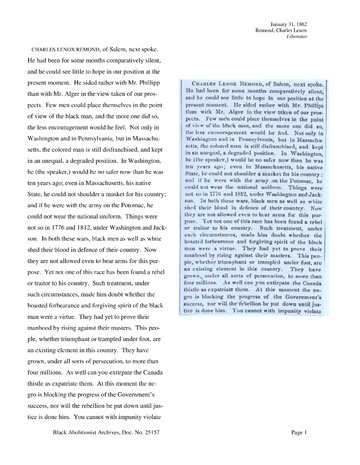
Speaker or author: Remond, Charles Lenox, 1810-1873
Newspaper or publication: Liberator
Brief speech in which the speaker expressed his dismay that African Americans were not welcomed into the army to fight for their own freedom. He noted that they had fought in 1776, but now were not permitted to bear arms.
Description of file(s): PDF 2 page, 361 word document (text and images)

Speaker or author: Bassett, Ebenezer D., 1833-1908
Newspaper or publication: Pacific Appeal
Brief speech denouncing the goals of the colonization of Africa by the U.S. government. (Includes MP3 audio file)
Description of file(s): PDF 1 page, 167 word document (text and image)
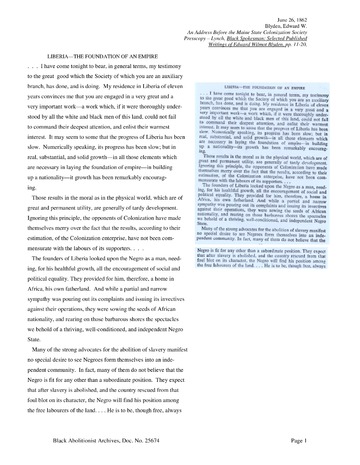
Speaker or author: Blyden, Edward Wilmot, 1832-1912.
Newspaper or publication: Presscopy -- Lynch, Black Spokesman: Selected Published Writings of Edward Wilmot Blyden, pp. 11-20
Speech supporting the African colonization efforts of freed slaves. The speaker emphasized the benefits of African Americans immigrating to Africa.
Description of file(s): PDF 12 page, 4,287 word document (text and images)
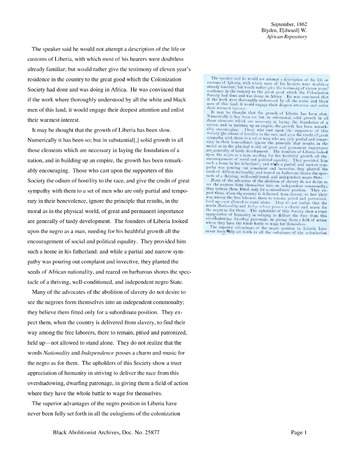
Speaker or author: Blyden, Edward Wilmot, 1832-1912.
Newspaper or publication: African Repository
The speaker described life in Africa with the U.S. colonization efforts taking place there. He encouraged freed slaves to immigrate and participate in the colonization of Liberia and Ethiopia.
Description of file(s): PDF 4 page, 1,331 word document (text and images)
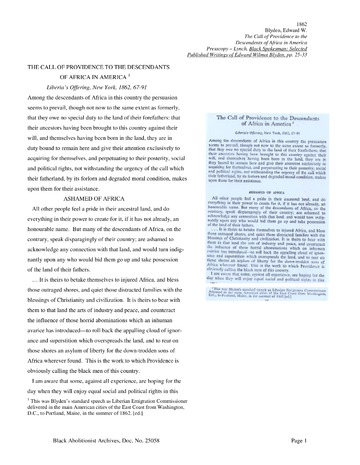
Speaker or author: Blyden, Edward Wilmot, 1832-1912.
Newspaper or publication: Presscopy -- Our Origin, Dangers and Duties -- Lynch, Black Spokesman: Selected Published Writings of Edward Wilmot Blyden, pp. 25-33
The speaker encouraged those of African descent to return to their "fatherland" and help cultivate and develop Africa. He believed that Africa offered opportunity and freedom that freed slaves could never find in America.
Description of file(s): PDF 11 page, 3,827 word document (text and images)
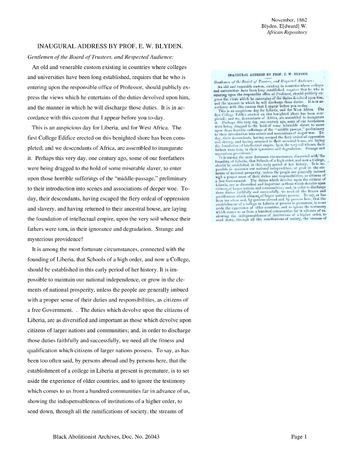
Speaker or author: Blyden, Edward Wilmot, 1832-1912.
Newspaper or publication: African Repository
Inaugural speech given at the founding of the first college in West Africa. The speaker stressed the importance of education in the formation of Liberia.
Description of file(s): PDF 22 page, 8,619 word document (text and images)
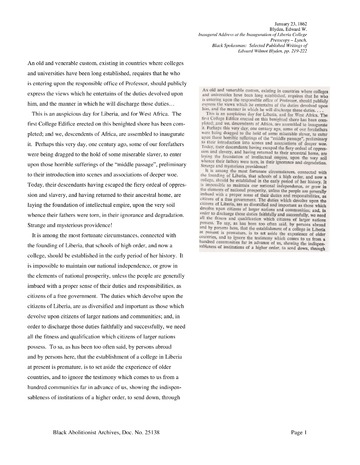
Speaker or author: Blyden, Edward Wilmot, 1832-1912.
Newspaper or publication: Presscopy -- Lynch, Black Spokesman: Selected Published Writings of Edward Wilmot Blyden, pp. 219-222
Inaugural address given at the opening of Liberia College in the newly formed colony of Liberia in West Africa. The speaker gave a brief history of the Africa people who had been captured into slavery and were now given the opportunity to return to their "fatherland" and establish a successful country based on freedom and liberty.
Description of file(s): PDF 5 page, 1,686 word document (text and images)
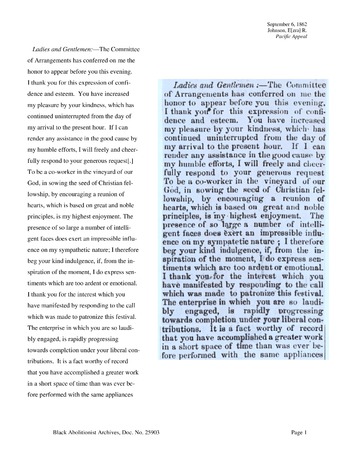
Speaker or author: Johnson, Ezra R.
Newspaper or publication: Pacific Appeal
Speech encouraging patience in the fight for emancipation and emphasizing the speaker's belief that it wouldn't be long before President Lincoln would abolish slavery nationwide.
Description of file(s): PDF 6 page, 1,200 word document (text and images)
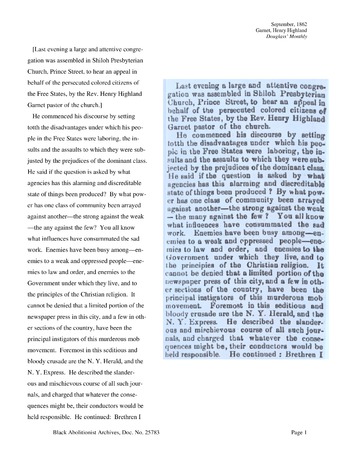
Speaker or author: Garnet, Henry Highland, 1815-1882
Newspaper or publication: Douglass' Monthly
The speaker argued that prejudice and acts of violence against the free people of color in the northern states was instigated by southern extremists in an effort to disrupt the union and encourage unrest. He accused northern newspapers and unjust journalism (fed by southern sympathies) for the current violence against black Americans in the north.
Description of file(s): PDF 4 page, 844 word document (text and images)
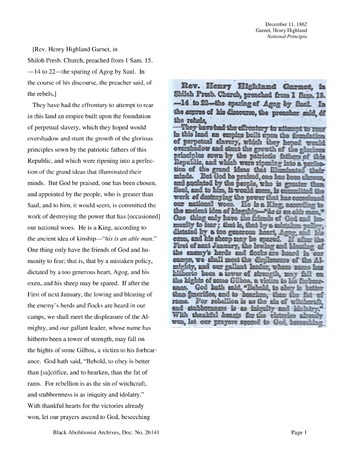
Speaker or author: Garnet, Henry Highland, 1815-1882
Newspaper or publication: National Principia
The speaker included in his sermon a comparison of Biblical text and the current Civil War. He implied that the uprising in the south was againt the will of God.
Description of file(s): PDF 2 page, 369 word document (text and images)
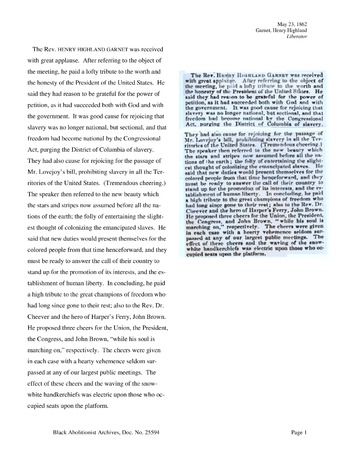
Speaker or author: Garnet, Henry Highland, 1815-1882
Newspaper or publication: Liberator
The speaker rejoiced that slavery was at that point no longer national but "sectional" since it had just been abolished in Washington, DC. He also noted that a recent bill had passed prohibiting slavery in the Territories of the U. S.
Description of file(s): PDF 1 page, 298 word document (text and image)
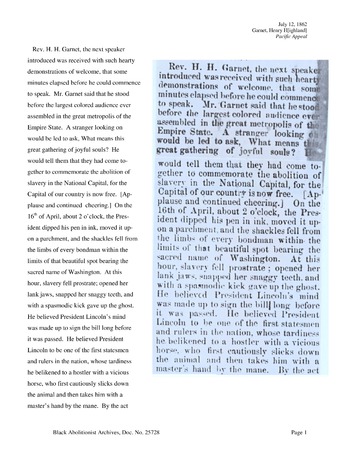
Speaker or author: Garnet, Henry Highland, 1815-1882
Newspaper or publication: Pacific Appeal
Overview of speech given before a large audience in celebration of the end of slavery in Washington, DC. The speaker was hopeful that this was just the beginning of the end of slavery for the entire U.S.
Description of file(s): PDF 2 page, 270 word document (text and images)
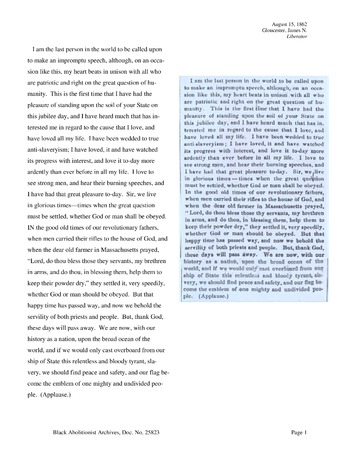
Speaker or author: Gloucester, James N.
Newspaper or publication: Liberator
Brief speech in which the speaker expressed his enthusiasm and optimism regarding the nearing end of slavery.
Description of file(s): PDF 1 page, 307 word document (text and image)
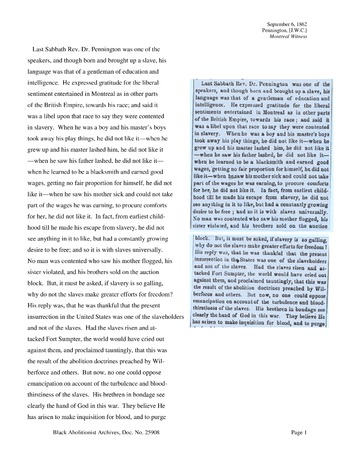
Speaker or author: Pennington, James W. C.
Newspaper or publication: Montreal Witness
Brief speech addressing the popular belief that slaves were content in their bondage. The speaker also spoke about temperance and addressed the issue of drinking alcohol.
Description of file(s): PDF 2 page, 590 word document (text and images)
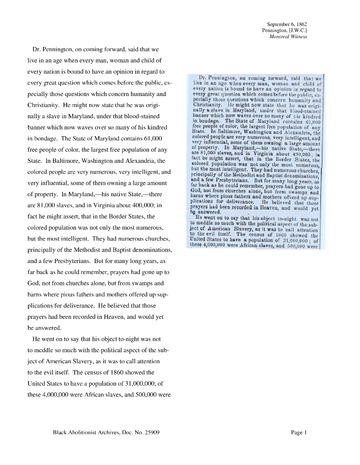
Speaker or author: Pennington, James W. C.
Newspaper or publication: Montreal Witness
Overview of speech addressing the question of what to do with the slaves if they are freed. The speaker offered statistical information on the slave population in the U. S. and the concentration of slaves in various states.
Description of file(s): PDF 4 page, 1,074 word document (text and images)
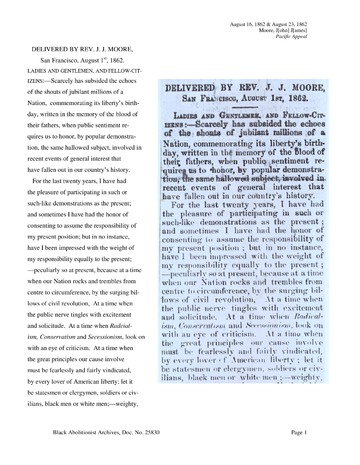
Speaker or author: Moore, John Jamison, 1818-1893.
Newspaper or publication: Pacific Appeal
Speech delivered in celebration of the emancipation of Washington, DC. The speech also commemorated the anniversary of the emancipation of the British West Indies. The speaker stressed the challenges that lay ahead for the country regarding the changes from a slave driven economy to a free wage economy. He traced the history of the abolitionist movement and emphasized his belief in the realization of total U. S. emancipation. (Speech 25858 is combined with this speech and included at the end of speech 25830.)
Description of file(s): PDF 13 page, 2,832 word document (text and images)
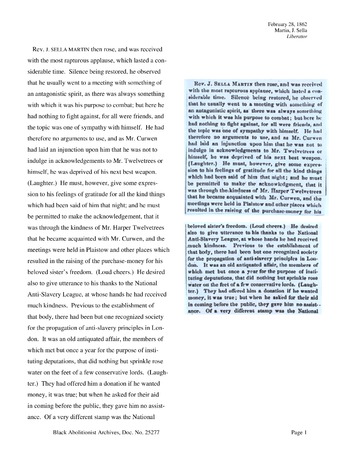
Speaker or author: Martin, J. Sella (John Sella), b. 1832
Newspaper or publication: Liberator
Speech delivered before an English audience recognizing the efforts of the National Anti-Slavery League and its members in the fight for universal abolition of slavery.
Description of file(s): PDF 4 page, 949 word document (text and images)
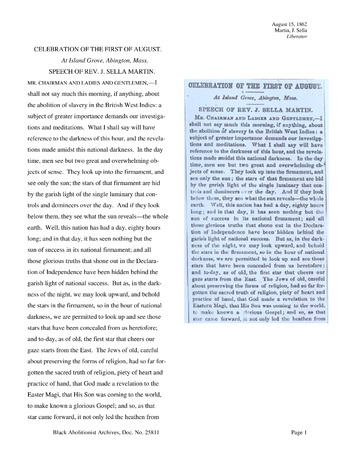
Speaker or author: Martin, J. Sella (John Sella), b. 1832
Newspaper or publication: Liberator
Sermon delivered during a celebration of the anniversary of the emancipation of the British West Indies. The speaker emphasized the error in moral judgment made by a country that condoned laws like the Fugitive Slave Law. He compared the plight of the slaves in the U.S. with that of slaves in ancient Egypt. He noted that the poor whites were not treated any better than the slaves were regardless of their skin color. The war for freedom was, to the speaker, a holy war for human liberty.
Description of file(s): PDF 15 page, 4,523 word document (text and images)
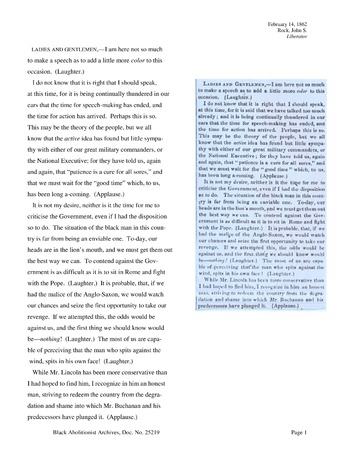
Speaker or author: Rock, John S. (John Sweat), 1825-1866
Newspaper or publication: Liberator
Speech regarding the influence the question of abolition has on decisions being made within the government during the Civil War. The speaker expressed his views about the war and its possible outcome.
Description of file(s): PDF 17 page, 5,123 word document (text and images)
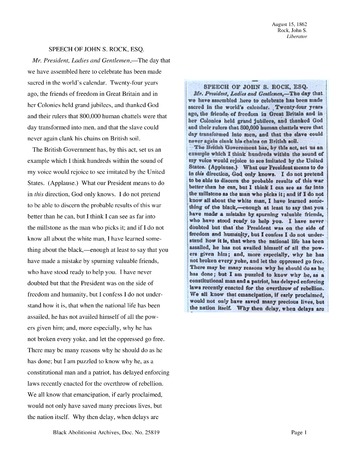
Speaker or author: Rock, John S. (John Sweat), 1825-1866
Newspaper or publication: Liberator
Speech delivered during a celebration of the August 1st anniversary of the emancipation of the British West Indies. The speaker noted that it was only a matter of time before the U.S. would also abolish slavery. He stressed the challenges of prejudice, lack of education and unemployment that lay ahead for African Americans when slavery is abolished in the U. S.
Description of file(s): PDF 11 page, 3,267 word document (text and images)
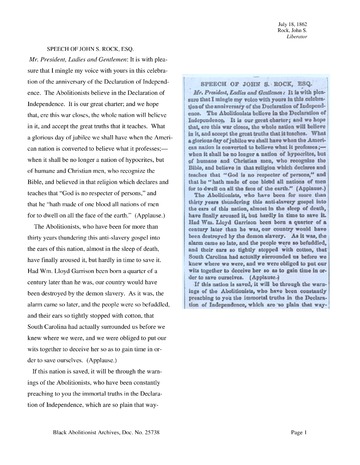
Speaker or author: Rock, John S. (John Sweat), 1825-1866
Newspaper or publication: Liberator
The speaker emphasized that the fight for freedom during the Civil War would be won through the work of the abolitionists. He then went on to praise two abolitionists in particular.
Description of file(s): PDF 11 page, 3,196 word document (text and images)
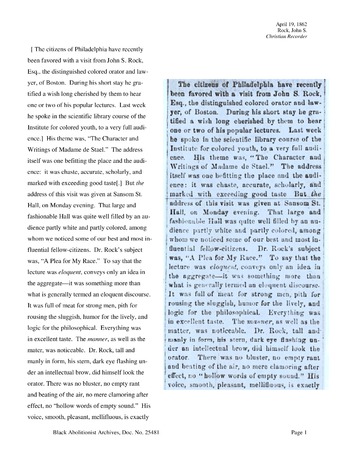
Speaker or author: Rock, John S. (John Sweat), 1825-1866
Newspaper or publication: Christian Recorder (1852 - 1856)
Brief overview of a speech regarding the refusal of the government to arm and accept as soldiers African Americans during the Civil War. This situation would alter as the war neared its end.
Description of file(s): PDF 2 page, 440 word document (text and images)
spe.pdf.jpg)
Speaker or author: DeGrasse, John V., 1817-ca.1866
Newspaper or publication: Liberator
Overview of brief acceptance speech delivered after the speaker was presented with a portrait of John T. Hilton.
Description of file(s): PDF 1 page, 262 word document (text and image)

Speaker or author: Bell, Philip A.
Newspaper or publication: Pacific Appeal
Brief speech comparing Jewish slavery with American slavery. The speaker emphasized the Biblical history of slavery. (Includes MP3 audio file)
Description of file(s): PDF 2 page, 348 word document (text and images)

Speaker or author: Morris, Robert, 1823-1882
Newspaper or publication: Liberator
Speech given after presentation of a portrait of John T. Hilton was given to the Masonic Lodge. The speaker stressed that while this was "...our first effort to transmit to posterity a portrait of any of our public men...", he regretted that portraits of other African American heroes had not been included in this effort.
Description of file(s): PDF 4 page, 1,095 word document (text and images)



